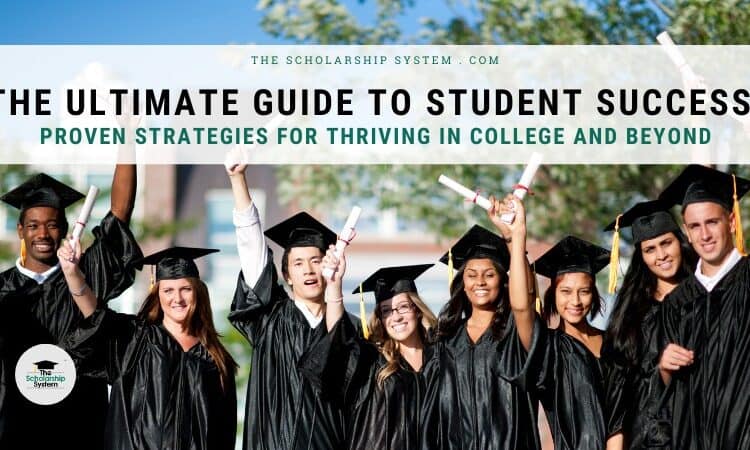Updated on March 30th, 2025
Stepping into the world of higher education is a thrilling milestone filled with new challenges, unexpected opportunities, and countless chances to grow. For many students, it’s their first time navigating independence, academic pressure, and a shifting sense of identity. It’s a time of transformation – but also one that can feel overwhelming without the right support, mindset, and habits in place.
If your student wants to boost student success by making college more affordable, we can help!
Sign up for our free college scholarship webinar to learn more about the scholarship process. Head over to http://thescholarshipsystem.com/freewebinar to reserve a spot today.
The college experience is more than just earning a degree; it’s about discovering what drives a student, how they learn best, and how to balance ambition with well-being. Every student wants to achieve their version of student success, whether that means acing exams, building meaningful connections, or preparing for a fulfilling life after graduation. And the truth is, thriving in college and beyond isn’t about perfection – it’s about progress, intention, and building the confidence to grow through each new step.
Contents
- 1 Defining and Measuring Student Success
- 2 Preparing Students for Higher Education
- 3 Enhancing the First-Year Experience
- 4 Supporting Student Wellbeing and Success
- 5 Balancing Academics & Extracurriculars Without Burnout
- 6 Building Strong Relationships with Professors & Mentors
- 7 Academic Success Strategies
- 8 Financial Literacy & Budgeting for Students
Defining and Measuring Student Success
Student success is more than a GPA or a diploma – it’s a dynamic and multifaceted journey shaped by academic achievement, personal growth, and meaningful engagement inside and outside the classroom.
While traditional markers like grades and test scores remain crucial, they don’t tell the whole story. Success looks different for every student, depending on their goals, backgrounds, and experiences, making it essential for higher education institutions to take a broader view of what it truly means to thrive.
To understand and support student success, institutions must define it clearly and track it intentionally. Metrics such as graduation rates, retention numbers, and levels of student engagement offer valuable insight into how students are doing.
However, balancing a data-driven approach with deeper, more human-centered indicators is a must. For instance, how students feel about their learning environment and whether they see themselves as valued members of their academic communities can be just as telling as any statistic.
A holistic approach goes beyond numbers to capture the whole student experience. By considering psychosocial development, mental wellness, and a student’s sense of belonging, institutions can uncover critical areas for improvement that might otherwise be missed. This helps ensure that every student – regardless of background – has the support they need to succeed on their own terms. It also reinforces the idea that success isn’t a fixed destination but an evolving process shaped by many interconnected factors.
Preparing Students for Higher Education
Supporting students before they even step onto campus is key to long-term student success. By building strong student success initiatives that extend beyond academics, institutions can foster cultural shifts that prioritize inclusion and equity. These initiatives may include summer bridge programs, early academic assessments, or mentorship opportunities – all designed to ensure students are not only academically prepared but emotionally and socially equipped to thrive.
When institutions actively address the achievement gap, they create pathways that empower more students to succeed in higher education. That means providing targeted education services and resources to those who need them most, including first-generation students and students from underserved communities.
When students feel prepared and supported from the start, they’re more likely to graduate, meet their goals, and carry the confidence they’ve gained into their future careers.
Enhancing the First-Year Experience
The first year of college can be an overwhelming transition, but it’s also a prime opportunity to set the foundation for long-term student progress. During this critical time, programs like first-year seminars and personalized orientations help students get their footing by offering structured academic and social support. These initiatives not only help with the day-to-day navigation of campus life but also build essential skills for college-level learning and time management.
Peer mentorship can be a powerful lifeline, especially for first-generation students who may lack a built-in network of college-savvy guides. By creating strong connections through peer-led support and accessible campus resources, universities give students the tools to persist through challenges and work steadily toward degree completion. These efforts aren’t just helpful – they’re a strategic investment in student retention and overall success, one project at a time.
Supporting Student Wellbeing and Success
A thriving student feels supported not just academically but mentally, emotionally, and physically. Student well-being is a cornerstone of student success, as students perform best when they feel safe, healthy, and valued.
Universities that take a proactive approach to wellness – offering mental health resources, physical fitness options, and emotional resilience workshops – are better equipped to nurture student learning and development both in and out of the classroom. When students are met with personalized support, they’re more likely to stay engaged and motivated through the ups and downs of college life.
Creating a culture of ecological validation – where students feel seen and appreciated for their identities and experiences – can transform how students connect to their campus. Encouraging open conversations about mental health and empowering students to seek help builds a stronger, more empathetic learning community.
When programs are designed with student well-being in mind and faculty are encouraged to take part in supporting the whole student, the entire campus becomes a space where success is not just expected but truly supported.
Balancing Academics & Extracurriculars Without Burnout
For many students, managing coursework, clubs, jobs, and social lives can feel like a constant juggling act. Staying organized is key to making the most of the student experience without burning out.
Digital tools, paper planners, and prioritization strategies allow students to map out responsibilities and set realistic expectations for their time. It’s not about doing everything – it’s about doing the right things with purpose. Students who develop strong habits early on are better equipped to manage stress and keep their academic and extracurricular goals in focus.
While it’s tempting to believe motivation alone is enough, research shows that building effective systems is what truly sets successful students apart. Procrastination often stems from a lack of structure rather than laziness, and the proper practices – such as time-blocking, accountability groups, or even simple to-do lists – can make a big difference.
Schools committed to improving the student experience should promote healthy work-life balance by modeling positive behaviors and encouraging participation in wellness-focused programs. When families and institutions work together to support these improvements, students gain the tools they need to thrive.
Building Strong Relationships with Professors & Mentors
Supportive connections between students and faculty can be powerful drivers of academic and personal growth. When faculty are engaged and accessible, students gain more than just knowledge – they gain encouragement, insight, and confidence. Universities that invest in training programs for faculty help create enriched environments where students benefit from thoughtful, inclusive, and personalized teaching. These relationships become especially impactful when built on mutual respect and open communication.
Mentorship plays a significant role in how students navigate the campus experience and stay on track toward their goals. With the right access to mentors – whether through formal advising, office hours, or peer-led programs – students are more likely to feel confident in their path and better prepared to overcome obstacles. These relationships not only enhance student learning but also improve graduation rates by keeping students connected and supported throughout their journey.
Academic Success Strategies
Thriving in college requires more than just attending class and passing exams – it takes deliberate planning, consistent effort, and access to the right resources. Universities play a vital role in fostering student success by offering academic support services such as tutoring centers, study workshops, and academic advising.
These services not only help students grasp challenging material but also teach them how to learn more effectively. For transfer students navigating a new educational environment, these tools can be especially crucial in building confidence and maintaining momentum toward their degree.
Empowering students to take ownership of their academic journey means helping them build essential skills like time management, goal setting, and critical thinking. When faculty actively encourage self-directed learning and provide real-world learning opportunities – like internships, research projects, and service-learning – students begin to see the practical connections between their coursework and future career paths. These experiences often bridge classroom learning and long-term success, preparing students not just to graduate but to thrive as capable alumni ready for the next big project in life.
Financial Literacy & Budgeting for Students
For many students, financial challenges are a far greater obstacle than academic pressure. Without the right support, issues like housing insecurity and tuition stress can derail a student’s path entirely.
That’s why universities increasingly invest in financial incentives, such as tuition assistance, textbook grants, and emergency aid funds. These aren’t handouts – they’re targeted tools to promote student success and keep students on track to graduate, especially those from low-income or first-generation backgrounds.
Equipping students with financial literacy is just as crucial as providing direct financial support. Creating a sustainable college budget helps students maintain stability throughout the semester and supports their overall well-being.
Understanding how to manage student loans, build credit responsibly, and set financial goals aligned with career goals gives students the confidence to make informed decisions. These skills can reduce long-term debt and promote smarter spending habits that last well beyond graduation.
Financial literacy education should be embedded into the student experience, not treated as an afterthought. Workshops, peer-led sessions, and online resources can make budgeting approachable and relevant.
For example, students who learn to evaluate long-term costs versus short-term convenience are better equipped to avoid financial pitfalls. When institutions address money management proactively, they help students see that financial security is not just about surviving college – it’s about building a foundation for success long after their education ends.
If your student believes that graduating debt-free is part of overall student success, we can help! Sign up for our free college scholarship webinar to learn more about the scholarship process! Head over to http://thescholarshipsystem.com/freewebinar to reserve a spot today.







Leave a Reply